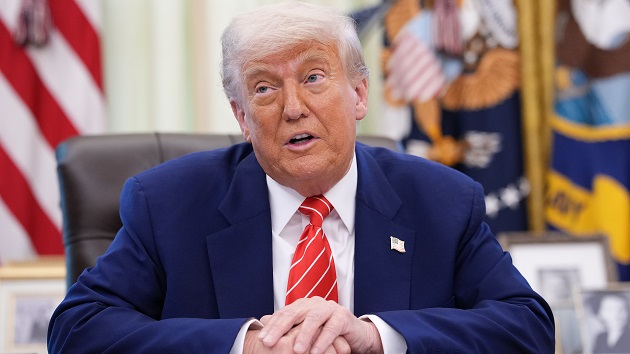
(WASHINGTON) — Price increases could hit canned soup, dishwashers, cars and an array of other products as a result of President Donald Trump’s planned hike of steel and aluminum tariffs, experts told ABC News.
The tariff escalation, set to take effect on Wednesday, ratchets up a tax on all foreign steel and aluminum from 25% to 50%. The move comes alongside a host of other levies, though it arrives days after a pair of federal court rulings cast doubt over the staying power of a large swathe of tariffs.
Trade experts told ABC News the fresh tariffs will likely raise prices for some goods made out of the two metals, since importers of the raw material typically pass along a share of the higher cost to consumers.
“Twenty-five percent tariffs were already high,” Kyle Handley, a professor of economics at the University of California, San Diego, told ABC News. “Fifty percent is incredibly high.”
In a social media post on Sunday, Trump touted the policy as a means of protecting domestic steel producers and safeguarding supply of key materials.
“We’re going to produce our own metal, unleash our own energy, secure our own future, build our Country, control our destiny and we are once again going to put Pennsylvania steel into the backbone of America like never before!” Trump said.
Here are the prices that may increase as a result of the tariff escalation for steel and aluminum:
Cars and trucks
Steel is the top material by weight in a car, accounting for about 60% of its weight, according to the American Iron and Steel Institute.
Once steel imports face stiff taxes, experts forecast the price of steel paid by U.S. manufacturers will rise, meaning higher input costs for automakers. Those companies, they added, are likely to hike prices for consumers as a means of offsetting some of those costs.
William Hauk, a professor of economics at the University of South Carolina who studies international trade, said the new tariff level could raise the price of a car by $2,000 to $4,000.
Trump previously imposed a 25% tariff on cars and car parts, but in April the president said the auto tariffs would not stack on top of steel and aluminum tariffs, meaning levies related to the two metals will count toward tariffs on a given vehicle only once.
Soup, soda and beer
Elevated aluminum tariffs risk higher prices for foods and beverages packaged in aluminum cans, such as beer and soft drinks, some experts said.
Fifty-percent tariffs on steel and aluminum will likely raise the price paid at the grocery store for each can of soup or soda by about 1 cent, Hauk said.
“It isn’t a huge amount on its own but if you think about the number of sodas or beers people have out of aluminum cans in a given year, it adds up over time,” Hauk told ABC News.
The previous set of 25% tariffs on aluminum cost the U.S. beverage industry $1.7 billion between 2018 and 2022, according to the Beer Institute, an industry trade group.
“Paying a tariff-laden price on all aluminum drives up the cost of doing business and makes consumer goods more expensive,” the Beer Institute said in 2022.
Refrigerators and washing machines
Major home appliances — such as refrigerators, dishwashers and washing machines — rely in part on steel, making them vulnerable to potential price increases, Handley said.
“All those things will be even more expensive to produce if the steel and aluminum inputs are more costly, which they absolutely will be,” Handley said.
In the aftermath of steel and aluminum tariffs during Trump’s first term, major appliances showed price increases of between 5% and 10% between June 2018 and April 2019, Jason Miller, a professor of supply chain management at Michigan State University, previously told ABC News, citing a monthly government data release.
Those price hikes far outpaced an overall inflation rate of around 2%.
Hauk, of the University of South Carolina, said the fresh levies will bring steel and aluminum tariffs to their highest levels since the mid-1930s.
“We haven’t seen tariffs on steel and aluminum this high in a long time,” Hauk said. “We’re kind of in uncharted territory.”
Copyright © 2025, ABC Audio. All rights reserved.




